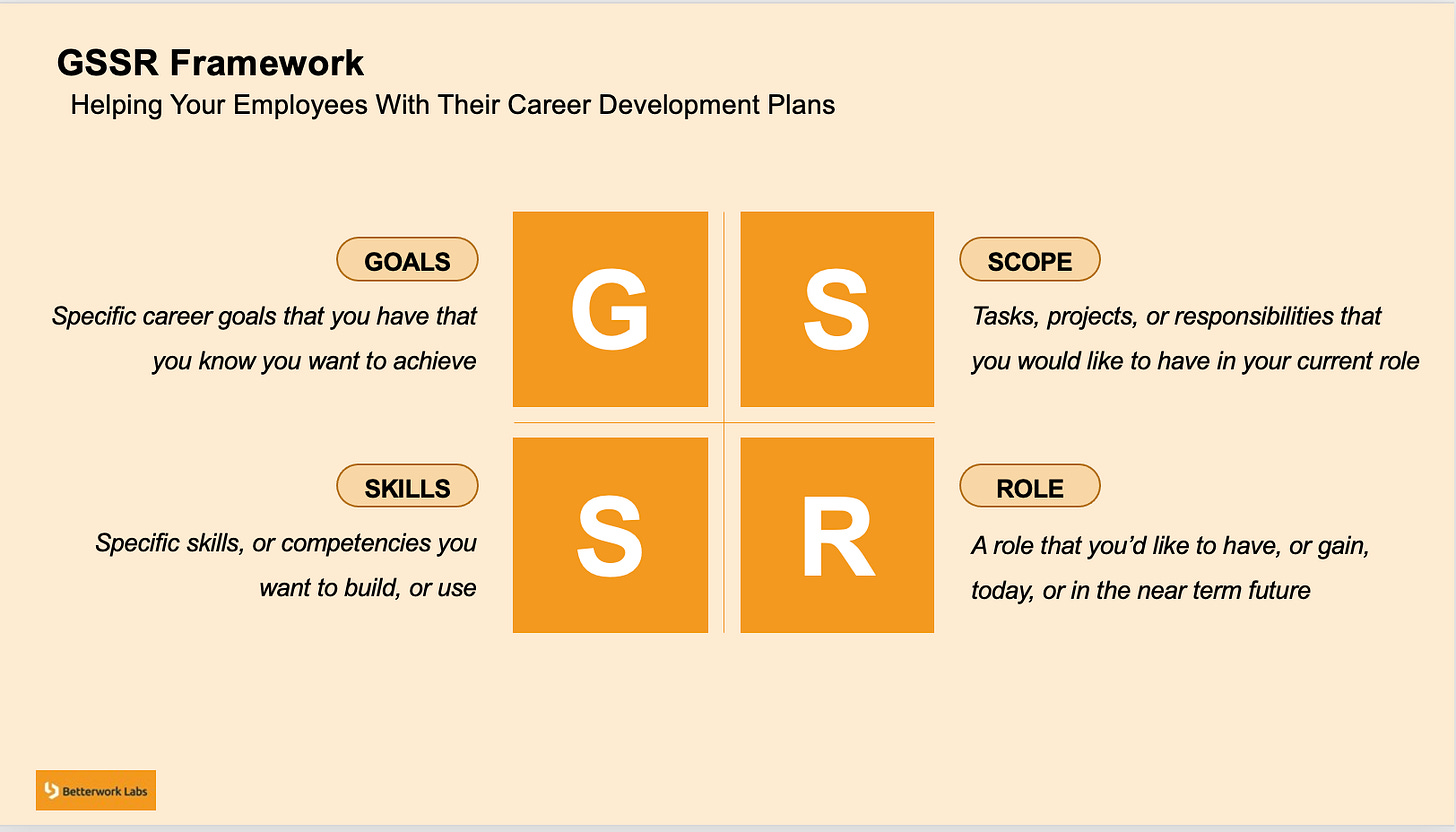How to Help Your Employees Develop Their Careers
A simple framework for your employees' career development plans
One of the common things I hear from managers who want to help their employees develop their careers is that they don’t know how to get them to think beyond promotions, raises or other extrinsic measures of success.
Those are important, but true growth, purpose and interest comes from intrinsic interests and desires. Furthermore, as a result of the Great Resignation, now more than ever is the time for managers to invest in their employees. According to research from Gloat, 48.1% of employees are currently or will be looking for a new job in the next 90 days, and 65.8% of employees who are looking for jobs outside of their organization identify better opportunities as their primary motivator.
To be sure, people do need to be evaluated and compensated fairly and in a way that aligns to their performance and outcomes, but assuming that’s being accounted for, here are some ways to help your employees think about how to move forward in their career and continue to learn and grow.
Introducing the GSSR Framework
Earlier in my career I was at a point where things were stalling out. I realized I couldn’t get promoted, but I knew that I still wanted to learn and grow, because while I would probably move on from the role and the company at some point, I wanted to continue to stay fresh and have skills to succeed wherever I landed next. That’s when I started thinking to myself, what are the ways in which I can develop my career?
That was when I came up with the GSSR Framework. GSSR stands for Goals, Scope, Skills, and Responsibilities. See below:
Goals: Specific career goals that you have that you know you want to achieve
Scope: Tasks, projects, or responsibilities that you would like to have in your current role
Skills: Specific skills, or competencies you want to build, or use
Role: A role that you’d like to have, or gain, today, or in the near term future
Here is an example of how I applied the GSSR framework to help frame my career development in as a Product Marketer back in 2019:
My Responses
Goals
Develop a thought leadership platform (ex: write a book, podcast)
Speak onstage at Dreamforce
Scope
Speaking at Customer Events (ex: World Tours)
Working with Sales and Customer Success
Leading People development initiatives for the team
Skills
Messaging and Positioning
Executive Presence
Delivering Feedback to others
Role
Become People Manager
How to use this template:
Share with your employees - Share this template with your employees, and encourage them to take time to think about this. Have them write down as much as they can at first without really thinking about how much is there (don’t want to winnow down too see)
Review it with your employees - in your next career conversation (separate from your performance evaluation, or from delivering any kind of job-related feedback) review what’s here and have a conversation around it. As much as possible, focus on asking open ended and thoughtful questions versus close-ended questions
Work with your employees to develop their action plan - Brainstorming, reflecting and ideating are important for career conversations, but it's only when we align our intentions with actions when we see results. Whether it's through a template your employer has, or any other career action plan, make sure your employees follow through on their plan
How Managers Can Help in The GSSR Framework:
Career development needs to be employee led but managed enabled. So what role do you play in using this framework?
Thought Partner - Your job is not to tell them what you think they should do, but to help them think through thoughtfully their options and ideas for growth and development
Context Provider - Because you are their manager, chances are, you have more experience and in some areas, more expertise. One of teh things you can do is to help them see the forest through the trees, and help them understand what they are writing down or thinking, connects to something bigger, such as their current role, the business impact, their customers, or anything related to their future aspirations
Talent Spotter - I’ve written previously about how we all need to be talent spotters. Sometimes we can’t see our strengths and nuggets about us that make us unique and special. Help them see where they are using their strengths and talents that you know they have, by providing specific feedback or insights as they come up in their GSSR framework.
Conclusion
One of my hard beliefs is that we need to talk more about career development in the workplace. Putting in triggers (ex: regular career conversations) and templates (GSSR) framework are ways we can do that in a way that helps managers develop their people and unleash productivity and engagement.


